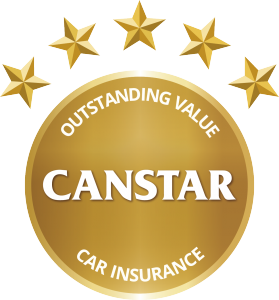 Canstar’s Car Insurance Star Ratings 2024
Canstar’s Car Insurance Star Ratings 2024Looking for the best value insurance cover for your car? Let Canstar’s Car Insurance Star Ratings be your guide to the best value car insurance policies in the market!
Canstar’s Car Insurance Star Ratings compare the cost and features of policies from 13 different insurance providers across six consumer profiles:

Car insurance gives drivers some protection from financial loss if their car is involved in an accident, is stolen, is damaged in a weather event or another risk included on your policy. If your car is damaged or written off, or you damage someone else’s vehicle in an accident, the cost to you could be significant, and a car insurance policy is designed to cover the majority of that cost.
Comprehensive car insurance is the highest level of car insurance coverage. It provides a level of financial cover for damage to other people’s cars and property in an accident, damage to your own vehicle caused by fire or theft, and accidental damage to your own vehicle, regardless of who caused the damage. It may also provide additional types of cover, such as damage to your car from storms or vandalism, depending on the insurer and policy you choose.
A comprehensive car insurance policy may also let you choose between market value and agreed value for your policy, meaning you could get a say in how much you’ll be paid in the event that your car is stolen or written off, depending on the policy. However, your choice may affect your premiums.
Choosing the policy that’s right for you could depend in part on what you can comfortably afford, so it may be worth considering the type of cover that suits your needs and your budget. For example, would you prefer the high level cover generally offered by a comprehensive policy, or would a lower level of cover be enough?
Car insurance covers policyholders for damage caused or costs incurred by unforeseen accidents or events involving the car they insure. The exact risks that are covered will depend on the level of cover that you have. For example, third party cover generally only covers costs if you damage someone else’s property in an accident, whereas comprehensive car insurance provides protection for a more extensive range of risks. Depending on the insurer and policy you choose, comprehensive car insurance could cover:
Although policies offered by different car insurers will vary, the types of car insurance can be boiled down to three levels of cover.
The most basic type of insurance, it covers all or part of your legal liability if you harm another person or damage their property. You will not be covered for damage to your own vehicle.
This is the same kind of insurance as standard third party, with additional cover for fire damage and theft. Some insurance companies will have policies that also cover damage caused by natural disasters.
This is the highest level of car insurance, covering you for almost anything that could happen on the road, or by the side of it. If you damage yours or another person’s property, you won’t be required to pay the full amount for repairs – only the pre-agreed excess amount.
Canstar’s Star Ratings are one factor you could use to help you compare comprehensive car insurance policies before getting a quote online. Our Ratings use a sophisticated and unique methodology that compares both price and features across products on our database. You can compare policies based on their Star Ratings using our above tables.
In addition, these are some of the other factors you may want to take into account when comparing car insurance policies:
The best car insurance policy for you will depend on your circumstances and the level of cover you are looking for. In assessing policies, you may like to ask yourself questions such as:
When you’re shopping around for cover, you may simply want to get the cheapest car insurance policy you can find. It can be important to also keep in mind the level of protection you’re getting for your money. For example, with optional forms of cover, third party property may be the cheapest car insurance in most situations, but it won’t cover you if your car is damaged in an accident or stolen.
Even if you decide on a higher level of cover, like comprehensive, there may be ways to keep the cost down. Some insurers offer discounts if you pay your premium annually or take out the policy online as opposed to over the phone, or you could opt to pay a higher excess if you need to make a claim. It can also help to shop around and compare quotes online from a number of insurers. These techniques may help you get value for your money, while still getting a higher level of cover than the cheapest car insurance might offer.